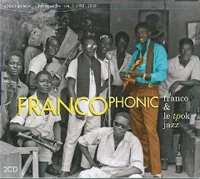
FRANCO & LE TPOK JAZZ
FRANCOPHONIC (Stern's STCD2041-2)
Franco Luambo Makiadi (1938-89), as everyone who reads this knows, was a giant of African music. This set is subtitled "Africa's greatest: a retrospective, vol 1: 1953-80." With his band OK Jazz he released at least 400 singles (more than half later compiled onto LP or CD) and Graeme Ewens' book CONGO COLOSSUS, the biography of Franco, records 84 LPs. Although Ewens' book came out in 1994, after Franco's death, it was during the huge onslaught of Franco CDs that recompiled tracks from the LPs that had been licensed to SonoDisc in Paris from Franco's own Edipop label. Ewens list 36 CDs; Asahi-net has 83. Even though I had the Sono LPs I bought the CDs in a fit of covetous collectimania. So now, when I complain about being broke, Deejay IJ tells me to put those Sono CDs on Amazon or EBAY where they will fetch big money. Now two decades after the man's death we have another Franco reissue, the first part of a two-part Stern's retrospective which has been in the making for a decade or more. How does it differ from what has gone before? There are three distinct aspects to consider: the sound, the liner notes, and the intelligence behind the construction of the set. The sound is as good as it can get without being substantially re-engineered. Before he built his own studio Franco was at the mercy of whatever facilities he used and you know how difficult it is to mike a huge 15 or 20 piece band. There seems to be less echo on "Kinsiona"; overall the sound quality is excellent. The liner notes by compiler Ken Braun are thorough and informative; of course the joke about Sono's liner notes is "What liner notes?" They never had any. In addition there are many wonderful photos which will be unfamiliar to you. Of course everyone has different favourite Franco songs and thinks they know how to put together a hot set, but in reality the people with most familiarity with his vast oeuvre will be most adept. So as far as sequencing goes, this is the definitive Franco retrospective, even taking into account the three or more recent efforts on the market, from Manteca, Rough Guide (both reviewed on Congo1 page), and the Sheer compilation which I reviewed on Congo3. Rough Guide & Manteca tried hard but you simply cannot get a reasonable Franco retrospective onto a single disc. Sheer had the luxury of two discs but screwed up the sequencing. Now we have Stern's: the most credible entry yet.
Disc one, "On entre OK," starts at the beginning with "Esengo ya mokili" by Dewayon which shows the rough and ready roots of the sound and features the debut of teenage Franco on his first day on the job at Loningisa studio on backing vocals and guitar. Then we rock out with a rumba, that is, a Congolese version of their idea of a rumba which, despite a hint of "El manicero" on Essous' clarinet, owes as much to Congolese folk rhythms. Similarly "Tcha tcha tcha de mi amor" could only by African (Braun, more specifically, says only from Lipopo!) and shows the beginning of an original approach to guitar, though Franco is not identified as the soloist. By track 8 we are firmly in the terrain of the grand maître. "Bato ya mabe batondi mboka" is an overtly political song, sung by Franco in his gruff voice. He takes a sharp stab at a lead and for once you sense the other musicians are augmenting him, respectfully leaving room for his moment of self-expression. We only get one song a year for the 1960s which is a pretty rapid progression and will make you want to find more of the albums. I am not going to second-guess the compiler but there is one track on disc one I would have omitted, track 11 "Ku kisantu kikwenda ko": it starts with talking and whistling, which rapidly becomes irritating. It was chosen for its political relevance and Franco certainly had a lot of that. But otherwise the sequencing is great. "Marie naboyi," one of my favourite OK Jazz rave-ups (sounding a lot like his younger brother's Orchestre Negro Succès), rocks out and when it stops you think the disc has ended, but then the quiet lilting guitar opening of "Boma l'heure" comes on and it is magnificent in its spareness. The backing is stripped down to maracas with a moody sax echoing the vocals and a flock of floozies singing a rather out-of-tune chorus. The first disc ends with "Infidelité Mado," a perfect song to have in your head in the ensuing silence. All of the tracks on disc one have been on CD before, either from Sonodisc, or in the case of the first few tracks, the Originalité album on RETRO and the Roots of Rumba Rock and Roots of OK Jazz on CRAMMED put together by Vincent Kenis. (Six of the tracks assembled here are also half of the Manteca CD FRANCO: The very best of the Rumba Giant, that came out in 2000.)
The second disc, "Tout puissance," is also a sharply honed set. Again there is an odd-track out, which I will get to in a moment. We kick off with the blockbusting AZDA, the 1973 paean to a Volkswagen dealership! (It has appeared on 5 or 6 CDs, most recently Congo Gold), "Mambu ma miondo" which is second, has appeared on 3 CDs and the third track, "Minuit eleki Lezi," is on a total of 6 previous CDs!) These three tracks, along with "Mabele" and "Kinsiona" were all on 1972/73/74 (Sonodisc CD 36538). This is the heart of the matter. The original albums were on Editions Populaires with Sam Mangwana and they were licensed first to Pathé-Marconi who issued them as two LPs and then to Sono who followed suit. When Sono made the CD, for once (perhaps lacking the motivation to screw it up or being so lazy they just mimicked the Pathé disc) they put both albums on one CD 36538. This demonstrates the rolling force of an OK Jazz session and is one of the most satisfying single CDs of Franco & TPOK Jazz. I listen to it regularly but I think of it as a Sam Mangwana and OK Jazz album. Perhaps for that reason the compiler, Ken Braun, has steered more towards the Franco tracks. After the roiling intensity of "Liberté" we get "Lisolo ya Adamo na Nzambe (Conversation between Adam and God)" which features Mangwana's partner from Les Maquisards, Ntesa Dalienst. The disc ends with an oddity: a song written and played in its entirety by Franco, with drum machine and swelling synth fills, "Nalingaka yo yo te." Its message is "I don't like you," as Franco was alone in Brussels and depressed. It's a strange end to the set. Braun has sought to show the entire reach of Franco's career: his politics, his band-leading skills, his poetry, and succeeds. It's maybe a bit didactic bringing in that last track, but there's much more greatness to look forward to in the next disc.
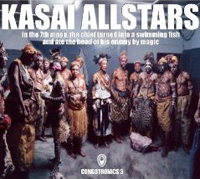
KASAI ALLSTARS
IN THE 7TH MOON, THE CHIEF TURNED INTO A SWIMMING FISH AND ATE THE HEAD OF HIS ENEMY BY MAGIC (Congotronics 3/ Crammed Disc CRAW44)
Kasai Allstars are well-known in the Congotronics realm because of their unusual make-up. I dont mean their body paint! I mean the composition of the group. They are traditional Kasaian musicians but they come from five different ethnic groups, not all of whom get along (to put it diplomatically). Kasai is in the Heart of the Congo and rich in diamond fields. The members came to the big city looking for fame and fortune and eventually made Kasai Allstars out of five separate bands who came from Songye, Lulua, Luba, Tetela and Luntu peoples. Two of the smaller bands, Basokin and Masanka Sankayi, appeared on Congotronics 2. Each group has its own culture and language but together they are a super jam group to beat the band. While Konono no 1 is essentially an electric likembe ensemble, Kasai Allstars include a xylophone played by Tshilumba "Baila" Luamba the acknowledged master, and two electric guitars. There are also buzzing likembes, frame drums, a lokole or slit log drum, rattles, and other percussion. The guitar makes a big difference: it is not played in a recognisable style, but used to augment the likembe patterns. There is a rhythmic pulse to the music, like breathing, that quickly gets inside your head and takes over your own respiration. The overall effect of this album is trance-inducing with occasional moments where you are reeled in by a guitar or vocal refrain. It's wonderfully meditative and rich.
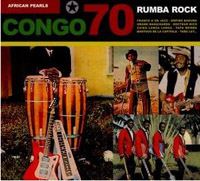
Congo 70 RUMBA ROCK (Syllart 6139342)
You might imagine I am in two minds about whether to review this CD. I love Congolese music so I have 90% of the music on here, but then you may not so I should tell you if it is worth hearing. I was disappointed in the Congo Gold compilation from Rough Guide that didn't go beyond the usual suspects. As in my review of Golden Afrique vol 2 (Network 29.076), I listed a few songs that I thought might have been worthy inclusions. I suggested Vercky's "Nakomitunaka," for one, and it is here, along with other groups I put forward: Les Bantous, Empire Bakuba, Les Maquisards, Bella Bella, Johnny Bokelo & others. CONGO 70 makes better use of the double disc format than Golden Afrique 2 did, casting a wider net, but also managing to get in two cuts by Les Maquisards & three from Franco. "Azda" by OK Jazz which was on Congo Gold is included here, but this set kicks off with an all-time Franco classic "Boma l'heure" from 1971. We jump forward to "Zonga Zonga" from 1978, an early recording of Viva la Musica with Papa Wemba on vocals, that was on Ngoyarto's recent La Naissance de l'orchestre Viva la Musica. It's an odd choice for a second cut, because it takes a while to get started but once it comes to the boil Bongo Wende and Rigo Star rip out the proverbial jams. From a programmer's point of view it would have worked better later in the set, along with the Zaiko track. The heavily anthologized "Tu m'as deçu Chouchou" is next. This lovely Hawaiian guitar workout by Nico was track 100 on the 4-CD MegaAfrica compilation; it's also on 30 Ans de l'Afrique and several Sonodisc comps. The "Get down with James Brown" segment is dedicated to Trio Madjesi and their jamming "Sex Madjesi" backed by Orchestre Sosoliso. (Note the shout-out to Mobutu!) And Bavon Marie Marie & Negro Succès are represented by the funky "Libangana Libumu." I can't figure why they haven't been added to the pantheon sooner. There's the warm and heavenly "Kamale" by Lipua Lipua and the lovely "Massamba MJ" by Fidèle Zizi and Mando Negro Kwala Kwa which came out on the Pathé Marconi label in Paris and then was anthologized on a Sono set 1962-73 (CD36591) and the 5-CD set of Mando Negro from Glenn. The wretched and pitiful "Le Bucheron" of Franklin Boukaka arranged by Manu Dibango is here. Really, only Africans can like this wet number, even if it does have a poignant political message. Most of the tracks on here are gems by bands who are worth devoting an hour or more to, so when I hear "Kamikaza" by OK Jazz, I want to take this off and dig out one of their discs. The closing cut "Beya Moke" by Sakade Band is the only one I did not already have & it is great. When this album becomes available for download by single tracks I predict a lot of people will want this cut as everything else has been around. Now Sylla seems to be carrying on the fine legacy of Sonodisc, who made a real hash of this cultural patrimony. The cover is most offensive: a bunch of sleeves were re-scanned them and then the "art director" (i.e. a**hole with Xacto) cut off Dr Nico's head. That is a very symbolic move. This is not a particularly well-sequenced set. The cuts by Viva la Musica, Zaiko and Empire Bakuba are not their best stuff. The tracks are seemingly just thrown on at random, but if you don't have a lot of classic Congolese rumba material in your collection you will soon find that it is worth pursuing, as much if not more than Afro Funk.
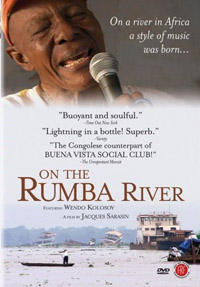
ON THE RUMBA RIVER (Directed by Jacques Sarasin)
(First Run Features DVD)
This film (which came out in 2006) got limited theatrical distribution in UK and America, but is a "must watch" on DVD. I already reviewed the soundtrack. The film itself is a treat. Wendo Kolosoy, for all his 80 years, is a spry dude. At the start you see him at home trying to snooze in the garden while his wife berates him for not going out and getting a job. It's funny but of course really sad that he has no income; still, he tells her he has some prospects of a tour and to that end gets together with his old cronies to rehearse and we see some wonderful music and interaction between these old-timers. The packaging, inevitably, calls them the Congolese Buena Vista Social Club, and like that Cuban enterprise they are all starting to check out for heavenly pastures. We drive around Molokai (the suburb of Kinshasa) with Wendo trying to find Joseph "Maproko" Munange, the sax player, veteran of Esengo studios and original member of Verckys' band. He fares no better than his vieux copain. "Stop that noise!" his wife tells him as he sits outside his home practicing. --I was already a musician when you married me, he complains. A younger member of the band (in his 60s) explains that Mobutu wanted to get all the old guys together, Camille, Dessoin, etc, but they didn't sing so well any more, and so they recruited a few younger guys. Such candid moments are intercut with extremely well-edited shots of the band rehearsing and performing. There are also images of decay, rust, rain, and ruin, crowded trains, and the great river where Wendo started out, now with its wreckage of ferry boats. He likes to preach and constantly harangues the band, but he saves his strongest remarks for the politicians who have allowed Congo to fall apart. (It does seem like geopolitical interests are allowing the war to continue. A century from now it may be called the Motorola Cel Phone War because the demand for coltan and gold is what is fueling the carnage.) But what else can the old musicians in Kin do but play? Finally Antoine Moundanda shows up with his thumb piano and some outlandish pants & joins in for a rousing finale.
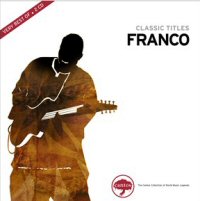
FRANCO
AFRICAN CLASSICS (SHEER SLCD147)
Franco is arguably the most important African musician of the last 50 years. The sound of OK Jazz permeated the continent and finally conquered Europe and the rest of the world. Though I have a vast Franco collection, it's always nice to get a fresh perspective on his music. This 2-disc compilation kicks off in full flood with "Matata mwasi na maboli esilaka te (As long as they are together, husband and wife will argue)" from the "20th Anniversary" sessions (& not the later "Co-operation" as stated) in 1975 when Franco had just poached the top talents from the band of his rival Tabu Ley Rochereau, including Michelino on guitar, Deyesse Empompo on sax, and Sam Mangwana and Pépé Ndombe, Afrisa's star vocalists. The talent theft was so serious it became an affair of state! Now for once you can read about all this in the liner notes, compiled by François Bensignor and Louis Malambu, which are excellent. For example, we learn the comical and lewd significance of "Quatre boutons"!
Three of the tracks were included in the Rough Guide to Franco. The hits reminds us of Franco's power, but there's one immediately apparent flaw in this new comp and that is the sequencing. It jumps restlessly from era to era which seems ill-conceived. It starts in the mid-70s, lurches forward 15 years, then back to 1958 in the course of three songs. I am not saying there should be a strict chronology, that only leads to inevitable decline as the shine wears off the early brilliance and you end up with the slogging 25-minute epics in a log jam at the end. These musical soap operas had their day, but were plagued by syndrums and cheesy synths replacing horns. If you can follow the dialogue they are long involved stories of tawdry romance, but for me they were the band on autopilot and, while I enjoyed "Bois Noir" and "Tres impoli" (the latter included here) in their time, I felt most of the Mamou and Mario sagas were a waste of airtime. There was an Irish actor (named Molloy), who did a one-man show in these parts. He told stories from his life in reverse order so he ended up as a hopeful young thing starting out on the stage at the end of the show. And that's an approach that would have worked here. The second disc goes back to the early days and spends a little more time in the 50s and 60s and seems a bit more coherent than disc one. But then it leaps 14 years from "Marceline" to "Mamou" (actually, as Ken Braun points out, not "Mamou" at all, but "Layile" sing by Jolie Detta -- Franco's answer to Mbilia Bel) and the inevitable "Mario" (part one).
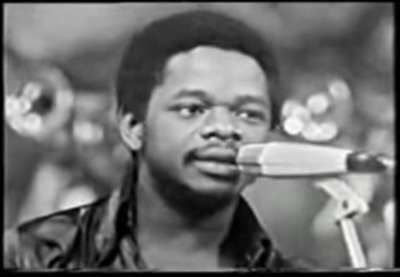
Sam Mangwana singing with OK Jazz
I believe everything on here is taken from previously released CDs, that is to say nothing has been excavated from vinyl. Sam Mangwana sings on a quarter of the tracks, from his two stints with the band. Three tracks from "Ou est le sérieux?" (Edipop/Ngoyarto) sung by Sam, form the core of this set. Apart from Franco he dominates the sound, despite Vicky Longomba, Youlou Mabiala, & Madilu System who were the main vocalists in different eras. The upside is this is a great two hours of OK Jazz; the downside is, apart from the odd sequence, there has been no attempt to remaster the sound, so there are some scratched 78s (the great early Vicky composition, "Tomeseni, zonga Coco [Come back Coco]") and some muddy or overmodulated tracks (the classics "Azda" & "Nabala ata mbwa [Why wouldn't I marry a dog?]") which would have benefitted from a little attention. But above all Franco's music is timeless, indeed suspends time, with its trancelike multiple looping guitar candences, so these two discs go on for ever, which is wonderful and you can bask in their aura as the hits, like "Azda" and "Alimatou," pour forth.
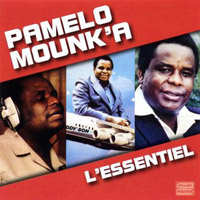
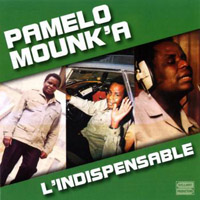
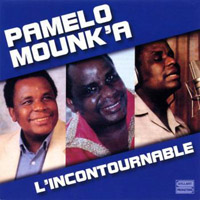
PAMELO MOUNK'A
L'ESSENTIAL (Syllart pmsyl001)
L'INDISPENSABLE (Syllart pmsyl002)
L'INCONTOURNABLE (Syllart pmsyl003)
Once again I find reissues more interesting than new product, as well as a dearth of anything truly new and exciting. And here I go reviewing a series of discs I don't own (because I have the vinyl and most of it already on CD also). Sylla has put out a three-CD set of the late great Pamelo Mounk'a, one of the finest singers to come out of the Congo in our lifetime. Pamelo died in 1996, aged 51. He was a big enough star to get top, even solo billing, when he was fronting the Bantous, so the album JOSIA JEE came out under his name though it was a Bantous album and included a Jean-Serge Essous composition. You will note on my AFRICAN TOP 50 page that I include a CD by Mounk'a called Plus grands succès vol 1, that came out on the KARAC label in 1993. If you have that, you don't need this new collection. Plus grands succès contained two superb LPs that were recorded under the direction of the great Antillean band-leader and arranger Eddy Gustave. The line-up included Master Mwana Congo on lead guitar, Pablo "Porthos" Lubadika on accompaniment, Dave Sakou on bass, and Domingo Salsero on drums. The regular horn section might include Jimmy & Fredo, even Eddy Gustav himself on saxophone. (A web search adds Emile Manga on trumpet, Kameni on sax, Lea Lignanzi on backing vocals, and Pierre Letchoumayen on congas.) This was the peak of a career that started when Pamelo was a teenager in 1963, singing alongside Rochereau in African Fiesta. Then he was known as Pablito and added the harmony to Tabu Ley and sang lead on some Cuban-style rumbas and cha chas delivered with impeccable aplomb by Docteur Nico and his men, such as "Me voy a cantar," "Amartes," "Camalie" and "P.B. Zonga." From there Pamelo joined the Orchestre le Peuple, Trio CEPACOS, in 1964, and then Les Bantous de la Capitale, scoring hits with "Masuwa," "Monsieur, on va se marier," and "Mama na Mwana." He also did a bit of nzonzing on his own, recording over 70 singles in makeshift studios in Brazzaville, and cementing his position as one of the most popular Congolese singers ever. In 1981 he was invited to Paris by Eddy Gustav where he recorded in a state of the art studio with the aforementioned stellar lineup and scored a massive hit with "L'argent appelle l'argent" (Money calls to money)" from a self-titled album on Sonics 79406. His follow-up album (Sonics 79413) contained two smash hits, "Samantha, tresor Hindou" and "Ce n'est que ma secretaire (It's only my secretary)"! and the lovely ballad "Amour, quand tu me prends..." His songs are clever and catchy and his silky voice has no compeer, except Rochereau. He made several more albums with the Paris session guys, including the "Red" album, Camitina (Sonics 79430), and Ça ne se prete pas (RC2001 1982), by which time he was hailed as the "No 1 Africain!" In 1983 back in Congo-Brazzaville he recorded 20 Ans de Carrière (Genidia 106) with Orchestre L'Afrisa of Rochereau and Mbilia Bel (an album that definitely has the hallmark Afrisa sound and consequently sounds a bit out of place here). But it was the Eddy'son, or Eddy Gustave sound that sold best, and even when he returned to Brazza and fronted his vieux copains in Les Bantous it didn't have the scintillating glitter of the Paris sessions. Essous' health, plus departures and other problems led to a long decline for the Bantous, as documented in my Bible, Gary Stewart's RUMBA ON THE RIVER. Sylla has reshuffled the deck and changed a couple of song titles to confuse prospective buyers. Essentially here is what he has on offer: L'ESSENTIAL contains the first half of Plus grands succès or the "L'argent appelle l'argent" album, along with a 1981 release on the Sonics label: the Propulsion album. This album, also produced by Eddy'son, was recommended to me by Steve Heilig of THE BEAT magazine as one of his all-time favourites. It all smokes. To round it up we get the B side of 20 Ans de Carrière. L'INDISPENSABLE contains the second half of Plus grands succès, or SAMANTHA and all of the "Red" album, Camitina. This is the one to get if you don't want to spring for all three, but I would recommend both if you don't have any Pamelo. If you have Plus grands succès you will only be duplicating the best stuff if you buy these. The third release L'INCONTOURNABLE, as the name suggests (?), is a bit more dispensable and obscure. It contains the Ça ne se prete pas album, plus the A side of 20 Ans de Carrière, and the last three tracks are titles I don't recognise, perhaps from Bantous albums, or stray 45s. I like the Ça ne se prete pas and Camitina albums, but if you search high and low you may find them on vinyl where it will sound better than in this context, I am sure. Unlike the recent return of Orchestre Baobab, who go from strength to strength, the Bantous reunion album fell short. Clearly they have lost too much over the course of time and nostalgia aside, they are definitely an historic band at this point. But so many stellar musicians passed through their ranks, and among their singers, including Kosmos Moutouari and Theo Blaise Kounkou, Pamelo Mounk'a was the greatest. I suppose Sylla could have stretched this out into a five-disc set so for that we should be grateful, but I don't like the way he chopped up the 20 Ans de Carrière and used it as filler. Still, it contains the heart of one of the greatest achievements in Congolese music of the early 1980s.
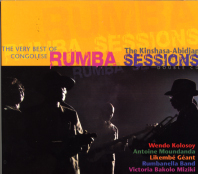
WENDO KOLOSOY / ANTOINE MOUNDANDA
RUMBANELLA / VICTORIA BAKOLO MIZIKI
THE VERY BEST OF CONGOLESE RUMBA: THE KINSHASA-ABIDJAN SESSIONS (Marabi 46923.2)
This is a revolving showcase of four acts, and a remix of the EL CONGO BRAZZA KIN album and Wendo's ON THE RUMBA RIVER. If you don't have any Wendo or Moundanda it makes a great introduction, but for me the best part of this disc is its variety and the flavour of early rumba imparted by the Rumbanella selections. They are not Kékélé, and other (electric) bands have done similar material better -- like Soukous Stars, even Kanda Bongo Man -- but their take on African Jazz standards is wonderful and vibrant. From Tabu Ley's debut "Kelya" to his "Sey Sey," from Kwamy's "el Congo," to Dechaud's "Africa Mokili Mobimba," and from Jean Bosco's "Massanga," to Dr Nico's "L'age et l'amour" and his "Ngalula," their taste is impeccable and the acoutic delivery simply gorgeous.
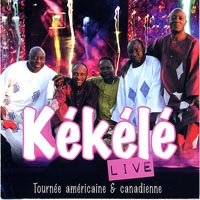
KEKELE
KEKELE LIVE: TOURNEE AMERICAINE & CANADIENNE (only available from CD Baby as a download)
For the first time I have bought a CD as a download (though I admit I have snaggled a few on the sly, most recently Neil Young in Amsterdam, which is worth seeking out). C.C. Smith, editor of The BEAT sent me the link to a live Kékélé concert: I checked out the sound on the CD Bébé site, which is board quality, so immediately grabbed it. C.C. has also started the inevitable myspace page for the band and if you check their friends there's a link to Quatre Etoiles. As I said in my review of their show in San Rafael from this 2005-6 tour, they were a lot hotter live than on the CDs. On tour they had Rigo Star instead of Papa Noel on second guitar and three singers which kept it focussed. Syran decided to authorize the sale of the concert tape on line. The CD Baby site also points you to several other albums available for immediate download, including a couple of Samba Mapangala & Virunga albums you probably have, a recollection of Sam Mangwana's Portuguese tracks, Quatre Etoiles' LIVE IN LONDON, and an outstanding soukous album: Syran's SYMBIOSE: BEST OF PARIS. If you don't have it, that disc is essential listening (It includes the same rhythm section and vocalists as Kékélé). The artwork for Kékélé Live is budget-quality and the liner notes are crummy, but the music is superb (though they clipped the end of a couple of songs). What's really striking -- without watching them play, or the antics of the singers -- is that you really get inside Syran's amazing finger picking. I thought it wouldn't be long before they went electric again, but he has been there, done that (Symbiose is a case in point, not to mention all the Lovy, Somo Somo, Quatre Etoiles, Sam Mangwana, Paris sessions etc, he played on) and now he has taken hold of something that is, to me, the legacy of Franco: a plucked two-finger lead, staggered tempi, and sustained repetitions of a phrase that push the rest of the band into a rhythmic frenzy (He started doing it when Quatre Etoiles did "Mado"). We also have Sebastien Malherbe on accordion and the legendary Jimmy Mvondo on sax (uncredited in the liner note, but Loko gives him a shout-out). Deba Sungu (ex-Afrisa International) on congas backs Komba Bellow's drum kit. The front line on the tour were three Congolese legends: Nyboma and Wuta Mayi of Quatre Etoiles & Loko Massengo of Vercky's wild break-out band Trio Madjesi (He had considerably bigger hair back then!). Wuta Mayi's "Affaire mokumwa" sounds like his earlier "Enfant Bamileke." In fact there is a familiarity to the whole sound, they have successfully reprocessed many musical ideas from their separate and collective past into a fantastic fusion of supercool rumba. There's now rumours of a Quatre Etoiles reunion tour, though I remember Quatre Etoiles did "Doublé doublé" unplugged on Georges Collinet's radio show Afropop (memo: find the tape), which was probably the spark for the idea of an unplugged band. They should just keep doing this until it gets tired, and if they can get Bopol back then call it a double bill and do both acoustic and electric sets. But this Kékélé concert is really smoking. The last three tracks lift you right up into the air. The "Ma-ni" chorus appears on the penultimate track so you know they are feeling positively Afro-Cubist. "Ça, c'est la rumba Congolaise," says Loko with satisfaction, as Jimmy breaks out some hot licks, Deba slaps fiercely, and Syran chugs on relentlessly. He finally makes the connection to Franco pointedly: it's an awesome moment as the song ends. One for the ages.
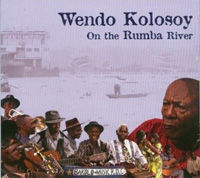
WENDO KOLOSOY
ON THE RUMBA RIVER (Marabi 46822.2)
Wendo is now up to three albums since his return to performing in 1999. An orphan who was kicked out of the Belgian church school for his verses, Wendo worked on the riverboats and had a career as a prize fighter before recording "Marie Louise" in 1948 and becoming a top performer. He is the last survivor from the roots of rumba and has assembled some great sidemen nearing his own age (he is 82) to perform in the style he first popularized 60 years ago: the acoustic precursor of rumba Congolaise. He stretches to the high notes and with his shaved brown head he does look like a tortoise. (But as Lewis Carroll would say, We call him tortoise because he taught us!) He has Joseph Munange (ex-African Jazz) on sax, Alphonse Biolo (ex-Afrisa) on trumpet and his old copain Antoine Moundanda on likembe. I thought I heard accordion too. Michel Vula, ex-Bella Bella, is on electric guitar as needed. Acoustic bass (Niandu Milandu) and congas (Mbingi Kabata) round out the line-up. There's a great echo to the recording, like they are in a big room with one microphone. This lends exceptional authenticity to the track "Rumba," which is a stately old African Jazz tune done as an instrumental. All it lacks is some surface crackle! Some of the tracks are taken from a 1993 recording (one is from 1972); the others are from 2004, but they cohere. They form the soundtrack to a documentary about him called ON THE RUMBA RIVER, directed by Jacques Sarasin. (Gary Stewart should have copyrighted that title!) I look forward to the film with great anticipation.
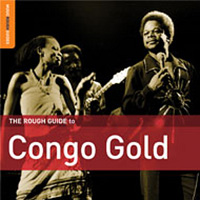
ROUGH GUIDE TO CONGO GOLD (Rough Guide RGNET1200)
We had the Rough Guide to Congolese Soukous compiled by Graeme Ewens and now its Martin Sinnock's turn to bring us CONGO GOLD. Rough Guides seem to be for people who have decided to explore world music with no prior exposure. Maybe they heard Mabulu on a TV commercial or caught Baobab on "Later with Jools Holland," but Rough Guide assumes they are blank slates, so their CDs really seem to start with basics. Therefore I have minor reservations about this latest compilation and will no doubt piss off those I hold most dear, my world music buddies. There were four oldies on the previous disc (RGNET 1050 CD), Franco & Sam Mangwana's "Odongo," Rochereau's "Sarah," RyCo Jazz doing "Marie Jose," and, from left field, Thu Zahina. Now we have another look at the formative years of African pop when Kinshasa ruled the airwaves. Franco, Sam and Tabu Ley return, but RyCo don't. There are some great choices on here and no bad tracks, but a surfeit of the same artists. It leads off with "Marie Louise" by Wendo, rather predictable. A clever trick would have been to use "Maria Tchebo" by Adou Elenga and then close with Sam Mangwana's 1983 version to show the development of the music. Kalle & African Jazz do "Parafifi," which is one of my favourite tunes by them. After "Adios Tete" by Rochereau and African Jazz we get to "le Dieu de la Guitar" Nico Mobali & African Fiesta doing "Mamu wa mpoy," one of his pyrotechnic slide guitar sorties. Apparently Jimi Hendrix went to meet him in Paris! That must have been quite a meeting. Then, newly inducted, Verckys brings his sax for "Marcello Tozongana," which was on the RETRO CD "Vintage Verckys." There are dozens of great Verckys tracks waiting to be anthologized, but presumably that was close to hand and already digitized. "Nakomitunaka," which is not widely available would have been preferable to one from the RETRO CD we all have. Furthermore there is a technical glitch at the fade-out of this song which was not fixed. "Azda" by Franco & OK Jazz is a real gem: a paean to a car dealership in Kinshasa. I imagine they got paid in Volkswagen Beetles for this smoker. Tabu Ley's "Nakweyi Carreau" was not in the Stern's box set so it was a good choice for inclusion. You can't go wrong with Sam Mangwana and as a bonus you get to hear Syran on guitar. "Eswi yo wapi?" by Mbilia Bel & Rochereau is certainly golden and was the lead track on BEL CANTO, Mbilia's recent Stern's compilation. Franco returns for a ten-minute "Mujinga" and things start to sound samey. Papa Noel's "Bon Samaritain" is good but it's basically more OK Jazz. Then we end with Madilu System's "Biya" which is here purely on sentimental grounds. Madilu just died but his post-OK Jazz career was largely thrashing about looking for a band big enough to frame him properly. He could have been omitted from this line-up. Most conspicuously missing are Les Bantous de la Capitale. Kiamuangana Mateta a.k.a. Verckys is promoted to the pantheon -- it's about time -- but we don't see any other inductees to the Congolese Music Hall of Fame, which surely by now includes Pamelo Mounka'a, Pepe Kalle & Empire Bakuba, Nyboma and Les Kamales, Les Maquisards, Bella Bella of the brothers Soki, and Quatre Etoiles, for starters. So where are they? If they are not sufficiently ancient then how about Mando Negro, Negro Band, Conga Jazz, Cercul Jazz, Vox Africa, Negro Succès, and Rock a'Mambo? Don't tell me their stuff is not available: it's what I listen to all the time. Obviously licensing rights has something to do with it, but we just had a ton of Rochereau and Mbilia Bel stuff put out by Stern's, so why overload on them here? Rochereau is a Golden Oldie, but he appears with African Jazz, Afrisa and with Mbilia Bel. He takes up a quarter of the CD while another third is taken up by two tracks from Franco. Yes Franco is King but rather than have two cuts why not do a Rough Guide to Franco? Oh, they already have (RGNET1071).
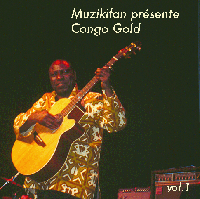
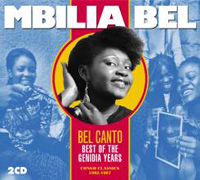
MBILIA BEL
BEL CANTO: BEST OF THE GENIDIA YEARS (CONGO CLASSICS 1982-7) (STERN'S SRCD3037-8)
In 1980 there were two big bands in Congo: Franco's All Powerful OK Jazz and Afrisa International of Tabu Ley Rochereau. Tabu Ley was the underdog and knew it. Sam Mangwana & guitarist Michelino whom he had nurtured, had abandoned him a few years earlier for OK Jazz. Bopol was gone, Empompo Loway was gone. He had some good guitarists in the band: Dizzy Mandjeku & Lokassa Ya Mbongo. He had rock solid Ringo Moya on drums. But he still didn't hit the heights of OK Jazz, and then these stellar sidemen ditched to join Sam Mangwana's African All Stars in Abidjan. Still there was plenty of hot young talent to audition & his old buddy saxman Mekanisi Modero stuck around. Afrisa and OK Jazz gave their all for fans and were cranking out records at a staggering rate. Franco had his 10-minute epics like "Tailleur," "Ilusse," "Peuch del Sol," "Loboko," from his boys club of Josky, Simarro, Wuta Mayi and the newly returned Sam Mangwana. It must have killed Tabu Ley when Ndombe Opetum signed on with OK Jazz, after all he sounded like Rochereau and had been the perfect harmonic foil for his voice in the 70s. But then in 1981 Rochereau was watching Abeti Masekini and her Redoubtables on La Voix du Zaire TV and noticed one of her backing dancers, a 21-year-old with great butt-wiggling moves. Rochereau hired her for his own backing dancers, the Rocherettes, same gig just bigger crowds, and soon Mbilia was demonstrating she could also sing. In 1983 Tabu Ley stepped back and let her have the spotlight for a whole LP of four songs backed by his smoking band. It was electrifying. She debuted in Nairobi on the band's East African tour and took all of Central Africa by storm, so by the time they got back to Kinshasa the fans were clamouring to see her.
Now Stern's has put together the cream of Mbilia Bel's work from Rochereau's own Genidia label, created in a state-of-the-art recording studio. This is truly magnificent music, indispensable, and a great slice of the musical pie à la mode. The hits keep coming. All of "Eswi yo Wapi?" All of the sequel "Faux Pas," the hits off her other discs, like "La beauté d'une femme." Solid. After their Nairobi gig, Afrisa recorded the biggest hit of East Africa, "Shauri Yako," and then took the chords and wrote new lyrics, the brilliant "Nakei Nairobi." Mbilia's voice soars over the superb arrangements.
There is an amazing aura to "Kelhia," perhaps because I played the first album so much it is completely ingrained in my mind, associated with the pleasant memories of my trip to Africa. She starts in a high register acapella, then the bass drum sets up a 144-bpm bomp and the two guitars start snaking in and out in "flanger" mode. I think Shaba Kahamba was in the band at this time also. Things were going so well Rochereau proposed and the two were hitched. But it was just a dream fostered by the limelight. Mbilia got on better with Rigo Star, the guitarist. Rumour has it Rochereau caught them together in the King George V Hotel in Paris and chased her through the streets brandishing a pistol. If it's not true, it still makes a great passionate conclusion to their story. Don't expect any reunion tours soon. But do check out the 17 fantastic songs on this lovingly presented set.
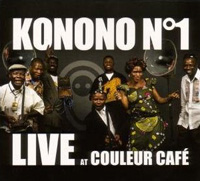
KONONO NO 1
LIVE AT COULEUR CAFE (Crammed Disc CRAW45)
Another exciting set from the Kinshasa garage band with electrified thumb pianos and home made percussion. This is high energy music, great to get you motivated for some housework, with enough of a trance vibe to make you feel you are not accomplishing anything and need to work harder. Call it a somewhat distorted sorcerer's apprentice, if you like. The recording is clean so you hear each member step up and solo creating a vibrant interplay between the sostenuo of the bass and treble likembes and whoever is playing the lead at any moment. When I saw them in concert they switched instruments and there was a young guy who took over and was truly entrancing. There's a big lokombe drum holding down the bottom, and whistles and yells of exhortation. In fact the vocals are more in the "Atalaku" style than singing. That is yelling out catch phrases and bits of folk wisdom. The atalaku is considered a bit of a trickster, like Coyote in American Indian myths and though they are often social outcasts, some atalakus have made it big, joining bands like Zaiko Langa Langa where they take over during the animation with vulgar dancing and clownish behaviour. Konono recorded this after their recent US tour, where they played Coachella and famously jammed with Björk, leading to their key contribution to her hit "Earth Intruders." This disc includes two remakes of songs on their debut CD on Crammed from 2004, but of course they sound different now. Also "Mama na bana" is very familiar. Ah, that's it, the Björk riff! Here it is raw for those of you who enjoy listening to similar tunes from different cultures back to back. The album ends with a great two-minute head-banging outro.
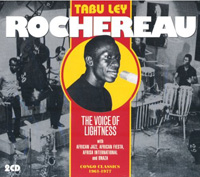
TABU LEY ROCHEREAU
THE VOICE OF LIGHTNESS (Sterns STCD 3027-28)
There are a handful of Congolese singers: Franco, Nyboma, Sam Mangwana, Papa Wemba, who have unmistakable and magical voices, capable of transporting you with a few notes. One of the most distinctive and purest of all singers to come out of the heart of Africa is Rochereau, now up in his 60s and last survivor of Generation Kalle. As a lad he worshipped African Jazz and started getting songs to them. One day, while still a teenager, he met his hero Joseph Kabasele (Le Grand Kalle) by chance and blurted out that it was he who was composing these tunes. He was offered a chance to sing with the band and stepped into the spotlight 50 years ago. This double disc wafts through his career, spinning a web of sonorous delicacy. We start with his first hit "Kelya," but there's only time for three African Jazz songs before we get to the crucial part of his career. In 1963 a splinter group left Kalle and started African Fiesta: this was the great moment for Docteur Nico to emerge from the shadow of Tino Baroza and establish himself as the ascendant guitar God. But Franco's OK Jazz was hard to beat. Franco's music was more rooted in folklore while the Kalle groups preferred the cha-chas and rumbas of Cuba. And they tended to inhabit a place in some idealized Cuba of dreams while OK Jazz was grounded in the dust of the marketplace. No wonder people craved the escapist fantasies of African Fiesta's montunos when Nico wove his dizzy leads around Willy Kuntima's ragged trumpet lines. Then they were off to Hawaii or the Wild West with slide guitar suggesting the empyrean in "N'daya paradis." Rochereau left to start another band in 1966 and we hear the moving "Mokolo nakokufa (the day I die)"-- a serious piece that even made it to literary anthologies-- then another gem: the lovely and silly "Savon Omo," a paean to soap sung with a fervent choirboy sincerity. The band kept changing; one suspects Rochereau was a tyrant as a boss though sax-player Mekanisi Modero stuck with him for three decades. Early guitarists, like Guvano Vangu, did their best to sound like Nico though, of course, there was only one "Dieu de la Guitare."
Another great tenor, Sam Mangwana, joined up for a spell with Rochereau and can be heard here harmonising on "Monano." When he left for OK Jazz he was considered a traitor, but the rivalry was between the fans, not between the two band-leaders. In fact Rochereau and Franco collaborated on a couple of outstanding albums together in the 80s. But this 2-disc set focuses on the earlier years.
The second disc has a big chunk of Afrisa International, the band that emerged after Rochereau had made it to Paris and was inventing new dances and trying new effects, like James Brown horn punctuation, wah-wah guitar, etc. With Afrisa, Rochereau really found himself. He was no longer trying to create African Fiesta sans Nico, but had evolved into his own man with a more international sound. Syllart started reissuing Rochereau's albums a year or more ago, taken from the Sonodisc LPs. I did not buy any as I have all the albums, but he did not reissue the full Live at Olympia or the FESTAC set which I think are his best whole albums. This is an eclectic selection from Rochereau's vast output but includes gems such as "Kaful mayay" (with a great sax solo from, I think, Empompo) and "Aon aon," and there's nothing to dispute among the choices. The last three tracks are by Onaza (Orchestre National du Zaire) which was the group Rochereau put together, with members of Zaiko Langa Langa, for the 1977 Festival of Arts and Culture in Lagos (known as Festac 77). The tracks get a little longer, including the classic ten-minute jam on "Adeito" which was on Live at FESTAC. For some reason they had part 2 in the middle of the first disc and part one later: thankfully Stern's reunited the two bits chronologically here. Finally Rochereau learned the main lesson from James Brown: Give the drummer some! We get a stretched-out series of solos to round out this excellent retrospective of one of the giants of the Congolese sound. The story goes thus far. We know that a year later the band ditched in Abidjan and the guitarists, Dizzy & Lokassa, and drummer Ringo Moya joined Sam Mangwana in African All Stars, but Rochereau would go on, discover Mbilia Bel and have another triumph in the 80s. Stay tuned.
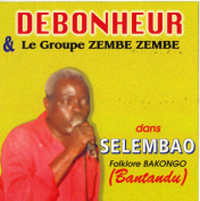
DEBONHEUR & LE GROUPE ZEMBE ZEMBE
SELEMBAO (Ngoyarto NGO65 ATB14)
This is an older album and may be hard to find, but I have been listening to it again along with the new Kenge Kenge from Kenya. It's folkloric music from the Congo, unplugged & vital. It's a 9-man ensemble. Three guitars, likembe and percussion, tapped bottles and shakers, no drums. They have small amps but it's not electric in the sense of the big rumba bands. Call and response vocals and a jet-fueled energy that pushes it forward. There was a Swiss label called Planisphare that put out half a dozen albums of Congolese folk music a couple of decades ago. I don't think they made it to CD but all are remarkable. They were field recordings made in Kinshasa in 1984-5 and featured Kawende et ses Copains (Zone Z1), Orchestre Sim-Sim International (Zone Z4) and Ali & Tams avec l'Orchestre MALO (Zone Z5). I missed the others, but at the same time I found Musiques Traditionelles Bantandu par l'Orchestre Yamba-Yamba Beto Ba that manifests the same spirit. The popularity of Konono No 1 brings this to mind and if you have had a chance to check out the exciting DVD in the Congotronix 2 package you will know what I am talking about. Despite the seeming indifference of some of the patrons having a beer, the performances are electrifying. There is also a documentary called JUPITER'S DANCE about the contemporary Kinshasa music scene that is well-worth seeing. Believe me I find most music videos a waste of time, but these two are superb. In the finest Franco-Belgian tradition there is no information about Debonheur in the CD package but the music, which also comes from Bantandu folklore, is fabulous.
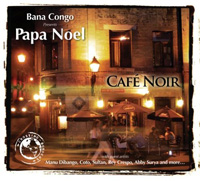
PAPA NOEL
CAFE NOIR (TUMI 141)
After a recent illness, Papa Noel is back. Noel was great with Kekele and fits in well with Sam Mangwana or as a guest on Ricardo Lemvo's new album. I wish he would consider getting in on the reunited Bantous tour this summer, but clearly he likes to be the boss. Here, with Bana Congo (The Congo Kids), is another great set of Cuban-influenced Congolese rumba like the kind he used to play with Joseph Kabaselle in African Jazz back in the day. In fact the album leads off with one of African Jazz's signature tunes "Africa mokili mobimba" which has notably been covered by Sam Mangwana, Ricardo Lemvo and Dr Nico, among others. The original riff owes a lot to the piano and horn stylings of Sonora Matancera. Noel plays acoustic guitar and, with the acoustic bass, congas, and "African percussion," the whole hearkens back to the unplugged sound of Independence-era Kinshasa. Another link to that time is the sax of Manu Dibango, the only other veteran sideman of Kabaselle still alive (Rochereau, now the mayor or governor of Kinshasa, was a front man). It is rather irritating that Noel takes credit for this composition, which is by Mwamba Dechaud. The whole trend to musical appropriation, especially among poor Africans, is sad: Come on, Noel, don't be a jerk, pay the family their due. Sultan Zembellat is drafted as vocalist as he has a stronger voice than Noel, though Noel's cracked vocals add charm to some of the songs (Maybe he's trying to sound like Wendo!); backing vocals are provided by Abby Surya & Stella Liv Makasso (from Guadeloupe). The addition of genuine Cuban tres (Coto Antonio Machin Garcia) and muted trumpet (Osmil Ordoñez Garcia) adds a lot to the sound while the repertoire flows back and forth between Paris and the Caribbean with son, zouk & merengue bouncing off the Frenchified soukous sound. Though it all sounds very familiar, it is a comforting and mellow album.
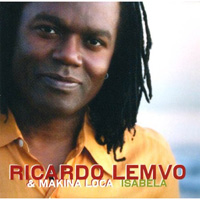
RICARDO LEMVO & MAKINA LOCA
ISABELA (Mopiata Music MOPI-2)
Ricardo Lemvo is charged up and ready to play. Plus he's got those stalwarts, Baby Jesus and Bopol Mansiamina in his corner, making this holy trinity of Afro-Latin party music infallible. In addition to his soukous hybrid, there's more Portuguese-influenced music on here (like Sam Mangwana he was born in the Congo of Angolan parents) adding a second circle to the diasporic currents he's floating in. Though Makina Loca can erect a sonic Tower of Babel without assistance they are augmented here by Papa Noel on acoustic guitar on four numbers and by half of the four stars, Wuta Mayi & Nyboma, on two others. They revisit Franco on "Malambo," and African Jazz on a sprightly cover of Tino Baroza's paean to Gina Lollobrigida. "Habari yako (How are you?)" switches to Swahili lyrics while the rhythm switches to reggae. It's not much of a tune & doesn't go anywhere: it's more of a sketch, but it put me in mind of "Night Nurse" by Greg Isaacs. Like Mangwana's "Minha Angola," Lemvo's "Serenata Angolana" is a ballad of the weepy wistful type. Noel adds guitar and there's soprano sax and accordion too. Cap Verdean chanteuse Maria de Barros joins in on the sufferer's choice chorus. But then things perk up decidedly for a charanga with the legendary charanga-fiddler Alfredo de la Fe on "Mentirosa." There's a rap which we can ignore and then some inspired jamming that reminds you of the classic albums of Orchestra Rhythmo Africa-Cubana from the late 80s. The title song returns to Lingala with muted trumpet for a classic Congolese rumba at which Lemvo excels with his honeyed delivery. After that we need some of the high-energy soukous sound, with banda horns (another Makina Loca specialty) that make this such a quintessential party band. Nseka Huit-Kilos who has been hanging back, fires up on this one (unless it is Bopol; my copy didn't have band credits). Then Huit-Kilos is evident on "Papa na bana" a last chance to boogie down before we get to the final ballad. "Elbete" shows yet another side of this immensely talented singer and polyglot vocalist: It's a bolero in Turkish! Alfredo de la Fe adds some violin fills & everyone does their bit perfectly, as you would expect from such a consummate band.
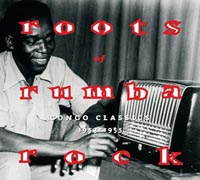
ROOTS OF RUMBA ROCK
CONGO CLASSICS 1953-1955 (Crammed Disc Craw33)
How wonderful that this fabulous collection of early Congolese rumba has been reissued in a handsome package that includes both original discs for the price of one. Actually I was happy to pay import prices for the two separate discs when they came out in 1991 because this is the legendary stuff that you only read about in books and wonder if you will ever get to hear it. Before Le Grand Kalle, before Franco, and long before Zaire, the (Belgian) Congo had some big stars who were household names. They were also "owned" by recording studios quite often run by shrewd Greek businessmen, in the case of this collection, the Loningisa label. (I always mentally associate this with longinisa or "sausage," though the artists would not want to be thought of as factory products.) The early fifties was a creative time for musical exploration in the Congo: Cubamania had not taken over, though you hear echoes of the clave beat in some songs and there's a gratuitous cover of "El manicero" done as "Mazole vanga sanga" by Bokalanga. Harmony vocals predominate, with acoustic guitar and intermittent brass; the percussion is simple: shekere or scrapers and rumba box. The booklet explains the songs, some of them just jolly adverts ("Margarina fina") but there are the usual concerns over beauty, courtship, advice, homilies about life. Some of these tunes are well implanted in my brain and are enduring favourites: "Nicodeme Lulu" has a weird organ but the acoustic guitars of De Wayon (& his younger brother Johnny Bokelo) coast along on the melody elegantly; their "Ayebi kobota" has nonsense lyrics based on hoodlum slang, while "Nyekese" has gravelly shouting. You can hear the proto-Rude Boys emerge. Lufungola Alphonse's "Prince Baudouin" --referring to the large boulevard in Leopoldville (Kinshasa) -- introduces electric guitar and has traffic noises on bells and saxophones. The call and response vocals, harmonies based on lingala intonation & guitar patterns that parallel likembe riffs (as on the rollicking "Odjali na mouchoir?" by Kitenge) are all indigenous, but you can hear traces of jazz, biguine, son montuno (even, Vincent Kenis suggests, Greek bouzouki music) in the tunes. Other favourites, Kalima Pierre's "Olingi na sala boni" and his "Na mokili moko te" have fanfare horns (tuba, sax, clarinets), derived from the Catholic church processionals, though here they rock out. Due to the limitations of the technology all the songs clock in at 3 minutes so there is no room for the exposition (sebene) that became such an integral part of the sound once the technology evolved, but they all -- Bowane, Liengo and lesser-known stars like Kalafayi -- manage to hit it and quit with aplomb. The only thing dated about this set is the typography of the booklet which is very '80s, but the photos are elegant and, despite the dated type choice and gratuitous letter-spacing, it is readable. If you could find these 78s in this condition you would have to spend about 5 grand to buy them, so grab this pair of discs and take a little trip.
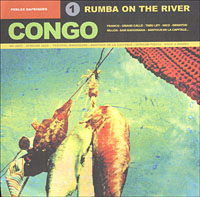
PERLE D'AFRIQUE: CONGO
RUMBA ON THE RIVER (Syllart)
As you my have gathered, if you read this column regularly, I love Congolese music, and the so-called rumba congolaise of the 60s and 70s is my soul music. This CD, RUMBA ON THE RIVER, borrows its title from Gary Stewart's excellent book. It all starts with the sweet harmonies of Kalle and his young protégé Tabu Ley. Then there's the can't-sit-still guitar of Tino Baroza and the questing sax and wistful clarinet of Essous, the slapped congas of Depuissant boxed in by the insistence of the clavé, which is never quite solidly Cuban. So I am in a dilemma because there's a lot of material reissued on the Syllart label which I should be covering in depth here, however there is a catch. If you read my article about the Sonodisc 360 series linked on the African window, you will see my opinion of Sono who threw stuff onto the market with no regard for the important cultural patrimony with which they had been entrusted. (A friend wrote: "Malambu used to have a big pile of LPs on the floor of the Sonodisc office -- half of them without sleeves." No wonder the CDs sounded so poor!) On my Dr Nico page I mention that Rochereau, as the last survivor of this generation of musicians -- le generation Kalle -- has been claiming composition of some of the material written by other members of African Fiesta. Ibrahim Sylla has apparently made a deal with Rochereau, and has started putting out some of the Congolese classics that have been off the market for too long. As you know, Congo is in the middle of a civil war. If you catch BBC news bulletins you learn that UN peacekeepers are pinned down by hostile fire, diplomats have been kidnapped, even in Kinshasa people cannot go out after dark because the supporters of the president and vice-president, the two main contenders in the current election, are shooting at one another. So even if you tried to contact songwriters or their descendants it might be hard to find those entitled to the small royalties due here.
The whole legal rights nightmare rears up again, tainting our enjoyment of the music. ASCAP & BMI will come after you for a cut per copy sold for the owner of the rights, but they don't do so for African music, to my knowledge. The way they collect fees from college or public radio stations (where you are more likely to hear non-mainstream music) and redistribute it seems random. Often in the case of African music the producer made the deal with the label and there were no contracts. In some documented cases, the producer Roger Izeidi made a deal with Fonior and paid the band for their work and probably their rights. I don't know what the French or Belgian statute for public domain is -- probably about 50 years; whether there is such a law in the Congo is anyone's guess. The Kalle material was previously leased by the Gefraco label of Brazzaville from Nono Tshamala Kabaselle in 1990. There's even Franco material on this new compilation and there has been a lot of contention over the last two decades about the title to his huge body of work. So, although I should keep my mouth shut and say "Enjoy the music," I feel someone is getting the shaft here and if it's Dr Nico's daughter, Izeidi's family or Kabaselle's son, then I feel sad.
Having said that. If you don't have the Sonodisc LPs or CDs, you will find some of the music, in different configurations, on the new Syllart releases. The African Jazz tracks were just reissued in May on SUCCES DES ANNEES 50/60, a reissue of SONO CD36560 with the addition of "Independence cha cha," which was previously on CD36501. Like other recent reissues of classic material we get the same obvious tracks and only one or two that are rarities.
Not all the Dr Nico tracks on here were previously on CD but were issued on Sonodisc LPs as follows: "Pesa le tout" (erroneously attributed here to African Jazz) is VITA 9a from 360.162, "Biantondi Kassanda" (VITA 73a) was on 360.011; "Rochereau Pascal" (VITA 56a) was on CD36501, and "Permission" (VITA 4b) was on CD36512. The two classic Bantous de la Capitale tracks were on CD36527 ("Tokumisa Congo"), and CD36592 ("Kumbele Kumbele"). There's one cut from Orchestre Rock-a-Mambo, a splinter group of African Jazz which Rochereau had no part of, and that is "Maria Valente." It's also the only track by them currently in print as it was on the DE DAKAR A CUBA ON DANSE LA RUMBA compilation last year, also from Syllart. There are five tracks from Franco & OK Jazz -- three were issued on Sonodisc (two on the CD 36555) and the other two are the genuine rarities on here, taken from vinyl -- "Musica tellema" was on an EP catalogue M45 (unless it's the mislabeled "Yo tellema" which was on LP360.167), and "Alliance mode succes" was on a double album OK JAZZ VOL 1 & 2 (Pathé Marconi 1965, reissued in 1977, now owned by EMI). Interestingly, this track "Alliance mode succès" and the Rock-a-Mambo track were originally released on 45s as "by DeWayon & Son Ensemble." So I am not rushing out to buy this, however it did send me back to the Gefraco CD LE GRAND KALLE Volume 1 (AMCD-01 F.170) which was taken from vinyl, complete with pops and scratches, the best single disc introduction to African Jazz.
I've been told this CD has good sound and excellent liner notes by Francois Bensignor. What I would like to see is some of the great stuff I don't already have (I do not have a complete collection by any means, so that is not a pipe dream); also a sense that the responsible parties are getting their fair share.
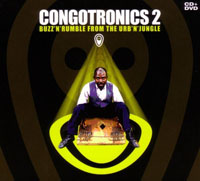
CONGOTRONICS 2
Buzz 'n' Rumble from the Urb'n Jungle (Crammed Disc CRAW29)
My Eurobuddies have been telling me for six months how great the new CONGOTRONICS album is, excelling even the first volume. I finally got a copy & I have to say it is truly mind-blowing. First of all there is a variety of groups on here, not just Konono #1 whom we know and love from the first album (as well as the great "Musiques Urbains à Kinshasa" [OCORA C559007] recorded in 1978). I believe the group Masanka Sankayi featured on two tracks here is the same as Orchestre Sankaï from the OCORA recordings. Otherwise there are the Kasai Allstars, Sobanza Mimanisa, Kisanzi Congo, Bolia wa Ndenge, and Basokin -- folkloric troupes from all over the Congo basin who have ended up in the big city. Again we hear home-made sound systems that create massive distortion, as well as some improvised instruments conjoined to traditional xylophones and thumb pianos and a battery of bottles and drums.
I am not big on music videos -- they require you to sit down and then monopolize your senses -- but the 41-minute bonus DVD is fabulous. It shows six of the bands during the recording session and makes a virtue of the amateurish quality of the shaky hand-held camera work. In fact the editing by Elsa Dahmani (daughter of "Latcho Drom" filmmaker Tony Gatliff) is a crash course in how to take crappy raw material and make it look good. The film reinforces what you guess from the music, that it is visceral raw roots music and has been modernised without losing its authenticity. Sure there are American college sweatshirts visible, but they are warmer than grass skirts. (Oxfam has dumped so much clothing on East Africa that is has put the local tailors out of business.) Like the sense of style, the music evolves. Electric bass plays the part you might have imagined on the lokole or slit log drum. You still have a groove that wont quit & that vertiginous feeling you get from inhaling narcotics. (If you have never inhaled narcotics imagine listening to music on headphones, drunk, laying on your back on a waterbed. -- Come to think of it, if you've never inhaled narcotics you've probably never been anywhere near a waterbed.) Let's just say the insistence of the music takes over your brainwaves and causes a kind of euphoria.
The giddy chaos of "Kiwembo" by Sobanza Mimanisa reminds me of trance meets punk rock, like the bands I used to follow in the 70s: the Mutants or Throbbing Gristle. Vincent Kenis's video captures them (their name means Orchestra of Light) recording before a huge crowd (the melomanes in the outdoor bar under a mural of a bloody bull's head rising from a cauldron; the curious on the street outside): the electric guitarist hammers away at three chords mercilessly, the thumb-piano player, riffing on the same pattern, has a far-away look in his eyes. His electrified likembe carries both bass and solo parts.
Bolia wa Ndenge perform some theatre where Papa Ndoi, one of the elders, appears in a vintage army uniform with medals and shako and says he has served King Leopold faithfully and do you know what his reward is? Un accordeon! (The liner notes say that H.M. Stanley, an accordion aficionado himself, suggested the idea to Poldy.) He hands the vintage squeezebox to a strikingly painted man in a wild hat who begins to jam while Ndoi and two girls shake a leg. One group that appears only on the DVD is called Tulu. They have two instruments that traveled to the New World: the berimbau and the jug (as heard in Appalachian music). Kenis tells us that their sardine can and spring rattle hasn't been discovered by the outside world yet.
Kasai Allstars (a collective consisting of four separate bands) quickly gets subdermal on "Kabuangoyi." Singer Muamboyi takes the lead, but it's the interjected guitar and ringing likembe that provide the memorable hooks.
Members of the Songye tribe from eastern Kasai now living in Kinshasa, Basokin (their name is a contraction of Basongye and Kinshasa) have so much distortion on their two guitars they're indistinguishable from the electricfied thumb pianos. Three drummers pummel their skins, and then there's the insistent tapping of metal on an empty bottle like a Morse code signal to the Primus brewers [... . -. -.. -- --- .-. . -... . . .-.]: send more beer. In common with the other bands Basokin have home-made amplification but outstandingly costumed dancers. National Gee should see these guys: leopardskin aprons, feathered head-dresses, white body paint and ceremonial (let's hope) axes. One of the shouters screeches like a leopard into his crispy fried microphone. The remarkable fact is this amazing sound was all captured on a Macintosh laptop. The only outboard amplification was the beat-up Fender amps used by the groups. You don't need drugs: Basokin's music quickly puts you into a trance (& it's kinder to your liver).
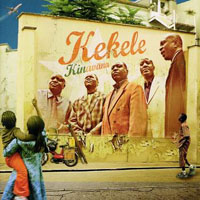
KEKELE
KINAVANA (Stern's STCD1101)
Music critics have to be cautious how much they admit, because there are always snipers ready to take them down for a verbal slip-up. Famously, back in the early 1970s, a Rolling Stone reviewer wrote, "I have been listening to the Blues for all of three months now...," so you know the rest of what he wrote was dismissed. Well, I have to admit I was into Congolese music long before I understood the Cuban connection, and while I did realize there were some obvious borrowings in riffs like "El Manisero," I didn't hear how deeply rooted the modern Congolese Rumba sound was in Cuban son and guajira until I started getting into Miguel Matamoros and Ignacio Piñeiro. Then I noticed the Congolese have a much more relaxed sense of tempo and eschew the metronomic rigors of the Cuban clave. It's been more than a few months -- a few decades -- that I have been into Cuban music now and Ñico Saquito & his ilk get almost equal time with Nico Kassanda on my speakers, though not quite.
Kékélé consists of the most accomplished Congolese musicians still standing from the great Proto-soukous wave of twenty years ago. They've mellowed and unplugged and now deserve to coast on their past successes. They are also entitled to reflect on their roots which they have done with KINAVANA, their most successful outing to date. To the flexible all-star roster of front-line talent they've added a solid Latin underpinning (arranged by Nelson Hernandez) of flute and strings to give a charanga backing to their exploration of the work of some of Cuba's great folk composers. It's not Buena Vista revisited, nor Africando, as you might think, because they are not singing in Spanish. In fact they have taken the original lyrics and phonetically transposed them to Lingala to create new lyrics, so Ñico Saquito's "Oye mi son" becomes "Yoka biso." This is also a part of the heritage as the reincorporated Cuban sones of the 30s were adapted to the Congo style with the violin and piano parts transposed to electric guitars. As Ken Braun notes, it wasn't so much appropriation as a repossession of something the Congolese realised was inherently theirs. In addition to the full sound provided by strings and horns, the return of Papa Noel after an enforced absence due to illness is most welcome. Mbilia Bel adds her sweet ethereal voice to a couple of numbers and the great hippo-voiced Madilu also shows up. Manu Dibango plays sax on five tracks. I've never found his work particularly deep and when he plays soprano it sounds like Kenny G. Though Manu D has a pedigree stretching back to African Team with Joseph Kabaselle, I think Nelson Hernandez should have brought his baritone to the session for a little more oomph. Hernandez does bring Isabel Martinez who has a fine voice but I object to her contribution on "Ba Kristo" where she adds a gratuitous Catholic litany to the wonderful "El Carretero," I don't think Guillermo Portables would approve. However he would appreciate the way the bass-driven momentum of the song is retained, as well as the prominent percussion, added by Luis Quintero who locks down the groove. Richard Virnet's muted trumpet is more New York than Santiago, adding a nice splash of urban sophistication to the metropolitan mix, especially on "Yo odeconer" (a reworking of Ñico Saquito's timeless classic "Al vaiven de mi carreta [the rocking of my cart]"). Syran and Papa Noel rise to the occasion pulling off some brilliant interplay on their Spanish guitars. The only track which is conceivably over the top is the tribute to Miguel Matamoros, "Oh, Miguel," sung by Loko Massengo (once the young raver of Trio Madjesi with a huge afro and matching platform boots). The orchestration swells with flute on stereo chorus, hovering strings, and what I called "bullfight horns" (a hint of the Tijuana Brass) when I heard it on African Fiesta's "Porti Caliente" and "Amartes." But it works as the florid centrepiece of this wonderful bouquet of choice songs.
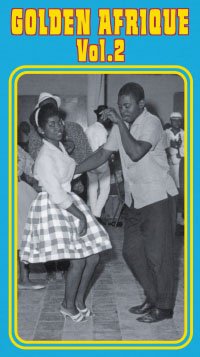
GOLDEN AFRIQUE VOL 2 (Network Medien 29.076)
(Highlights and rarities from the golden era of African pop music [1956-82]: the great days of rumba Congolaise and early soukous)
It's funny to be excited about a new CD when I already have all the music on it. I suppose it's my quasi-professional curiosity, to see how I would have done it differently. The music of the Congo is my passion and an introduction to early Congolese popular music could easily be a multi-disc set (or a full ipod). The riches are so deep it's tough to think of winnowing it down to 27 tracks, and the compilers have done a good job, while omitting some obvious things, and duplicating a bit too much.
I suppose the first consideration is the licensing. How do you lease a Franco track, for example? Franco left more widows than Bob Marley. Just imagine trying to get them together as a Board of Executrixes? The first disc is devoted to the big guns, in fact it leads with trumps which is a questionable move if you aren't playing with a full deck: the opener "Odongo" (Mislabelled "Co-operation" here -- that's the title of the album) by Franco & Sam Mangwana is THE definitive Congolese track. When the Congolese finally send a rocket into outer space it will have an 8-track cassette in the dashboard playing that song endlessly in a loop. Nyboma & his dynamic Kamales move to second place with "Doublé Doublé," an irresistible dance groove. Arguably (instead of playing your ace of hearts up front, after your ace of clubs) this should have been held back to close the set. Then we get to "Africa Mokili Mobimba" and "Independence Cha Cha" the seminal tracks of Joseph Kabaselle & African Jazz. These are essential though it might have been interesting to throw in a less well-known number like "Para Fifi" or "Jamais Kolonga." There's a solid Bantous track but it doesn't particularly showcase their twin hornsmen, great guitarists, or fine singers. The two tracks from Dr Nico are prime: a snaking guitar-driven instrumental composed by his elder brother Mwamba Dechaud, and a chance to hear the Docteur's sublime Hawaiian stylings on "Pauline." A third track from Sam Mangwana "Bawayo" with Tiers Monde, featuring Empompo Loway on soprano sax ends the first disc.
What's missing? Lots of stuff: Wendo, Mando Negro Kwala Kwa, Negro Band, Negro Succès with Bavon Marie-Marie, Les Maquisards with Ntesa Dalienst, Johnny Bokelo & Conga Succès, Josky with Orchestra Continental, Vox Africa with Jeannot Bombenga, Empire Bakuba, Papa Noel with Orchestre Bamboula, Lovy du Zaire, etc. It's a long list. But there's only so much you can get on a CD and some of these tracks are ten minutes long. More of the early stuff can be found on the two ROOTS OF RUMBA ROCK CDs on Crammed Disc, but the later material was in the Sonodisc catalogue which is currently in abeyance. (Apart from the pressing question of what their legal claim to the music actually is.) The first CD in the Merveilles du Passé series that SonoDisc issued in 1991 had both of the Kabaselle tracks you find here and a range of other things from Roitelet and Roger's "Banga imana" to Zaiko Langa Langa with Papa Wemba singing "C'est la verité." Along the way they work in a couple of things I would have found room for here: Orchestre Veve's "Nakomitunaka" (which was sadly missing from the VINTAGE VERCKYS set on RetroAfric), and "Yalimbisa bijou," a choice cut from Negro Succès featuring Bavon Marie-Marie.
The second disc opens with a great number by "Fan Fan" SeSengo from his outstanding BELLE EPOQUE collection on RetroAfric. This song was actually recorded in Nairobi and featured Tanzanian and Kenyan musicians but you would think it was straight out of Kinshasa. Ry-Co Jazz, who toured the world, spending two years in Martinique from whence they sent home the lilting Antillean rhythms (so effectively captured by Sam Mangwana and his African All Stars), are up with "Mambo Ry-Co," also borrowed from the RetroAfric archives. M'Pongo Love's "Ndaya" is a great track and has the sax of Empompo again, along with a great montuno-continuo on a slightly out-of-tuno piano. Her voice is a bit warbly but she was adored in her day. The second disc could be tidied up. Sam Mangwana returns for a fourth time dueting with Rochereau on "Como bacalao," a poorly recorded song that could have been left out. This is followed by a 10-minute piece from Rochereau, "Mazé," that is good but not essential (at that length) particularly when he pops up again with the brilliant "Aon Aon" a couple of tracks later. Manu Dibango's solo "Ekedy" is rather flat and I would have preferred to hear him with African Team. Instead of coming up to 1982 and hitting hard on the roots of soukous, this second disc goes backwards and returns to the folkloric roots of the music in the 50s, drawing on the pair of LES PIONNIERS discs, BANKOLO MIZIKI 1 & 2 on Ngoyarto. This part could have been compressed or moved up to make room for a big finish with Bopol Mansiamina, Syran Mbenza, Ntesa Dalenst, Youlou Mabiala or Pamelo Mounk'a. As it is, the second disc flutters up and then subsides and lacks the solid structure of the first disc.
In the final analysis, here's how I would have programmed it differently: Disc one, cut Nyboma's "Doublé Doublé" and move it to the end of disc two. Move the last three cuts on disc two to the start of Disc one, after Franco & before Kabaselle. Cut Camille Feruzi and OK Jazz and replace with "Infidelité Mado." Cut Dr Nico's "Exhibition Dechaud" and replace with "Echantillon ya pamba." Otherwise Disc one is a gem. Disc two needs revamping: I'd cut Tabu Ley's "Mazé" and replace with Mbilia Bel (& the same band) doing "Eswi yo wapi?" Cut the Rochereau and Sam Mangwana track and substitute "La vie" by Sam and Vox Negros from 1971. You don't need three Camille Feruzi tracks when there's no Wendo, so add "Marie Louise" by Wendo, and "Maria Tchebo" by Adou Elenga for good measure. Also add "Nicodeme Lulu" by De Wayon from ROOTS OF RUMBA ROCK 2. Cut the rest of Disc two after track six, except "Aon Aon". That leaves 24 minutes to play with! "Voiture ya occasion" by Mando Negro is a fabulous track that would work well (Glenn Succes reissued it in 1995 but I believe it was originally published by Pathé-Marconi, which means EMI now holds the rights). "Jaria" by Les Maquisards is blissed-out: it's got to be there. We need the essential "Mwambe no 5" by Johnny Bokelo & Conga Succes. We also need some of that pulsing rumba from the 70s with churning guitar and bleating sax -- in fact you can't call this a representative selection without it! So let's go with Essous and Les Bantous doing their theme "Bantous de la Capitale," or "Tokumisa Congo." That leaves just enough time to squeeze in Bopol and Syran performing "Manuela" & call it a wrap.
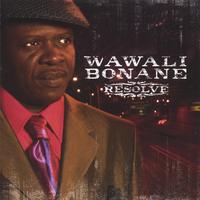
WAWALI BONANE
RESOLVE
Though the music is familiar I was trying to place the name of this artist. But then when he started singing it all came back to me. He was the Rochereau backing singer who was better than his boss. I feel sorry for Tabu Ley Rochereau. He lost his girl, then he lost his voice, and then he lost his band. There's also the Pygmalion story here: As is well known, Tabu Ley promoted Mbilia Bel from dancer to singer to co-star and then she ditched the poor sap (That's what you get for calling your dancers the Rocherettes!). He called Mobutu names then appealed for asylum in France claiming he couldn't go back to Zaire, but was turned down. So he came on tour to the USA and was so well-received he moved here. But his voice wasn't up to the rigours of a two-hour show every night, so he hired a singer who could sing just like him. At some point the band ditched him and became Yoka Nzenze. I don't know what Tabu Ley is doing now. When I met him he commented that all his generation had died, but there is a renewed interest in Congolese rumba so if he can get a band together there should be a spot for him, though not the Las Vegas casino he probably feels he deserves. Meanwhile, or whinemeal, there's Wawali Bonane with his fine voice and a laid-back soukous groove that periodically tears it up. Huit Kilos on guitar is one of the best exponents of the form working today. The music is formulaic but there's real drums (& congas) to make up for the synth. They cover a Jhonny Bokelo song, "Sandoka," and a ballad, "Fote ya biele," that uses my favourite groove "the Peanut Vendor" as the main structure. But the Bokelo track should have ended the album, instead there's a remix of the wet ballad (and when Congolese do wet ballads they are sodden) that is not that different from the forgettable version that appeared earlier in the sequence. A truly grave mistake, but you can always cut it after "Sandoka."
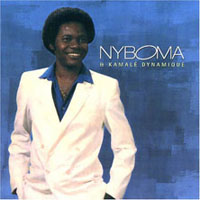
NYBOMA & LES KAMALE DYNAMIQUE (Sterns STCD3023)
Look at that suave devil on the cover: He's grinning because he is possessed of the finest tenor voice in Africa and this album showcases it with some of the most sparkling guitar riffs you'll ever hear. It doesn't get better than this: the cream of Nyboma and les Kamales' recordings condensed to a single CD. I have the vinyl but it's great to hear a stripped down to the essentials compilation like this. And of course it gets me listening to the albums to see what I would have done differently. Nyboma Mwan'dido started out singing with the legendary Orchestre Negro Succes, which folded after the death of guitarist Bavon Marie Marie. He joined Baby National in 1969, then the phenomenal Bella Bella of Soki brothers. He broke away to start another Vercky's band called Lipua Lipua and scored a massive hit with the song "Kamale" (a friend's mis-pronunciation of the French word "camerade"). So when he left Lipua Lipua to regroup he called his next band Les Kamale. The span of the Kamale's recording career has two parts. In the 1970s they were a massively popular danceband with their hits "Salanga" and "Afida na ngai." Then in 1979 Nyboma was drafted into Sam Mangwana's African All-Stars in Togo. Actually Sam was no longer with these All-Stars, having moved on to Abidjan, Ivory Coast. Drummer Ringo Moya and guitarists Lokassa ya Mbongo and Dizzy Mandjeku had a gig but no lead singer, so they flew Nyboma to Lomé to fulfill their contract at one of the town's bright nightspots. In 1981 when Nyboma was ready to record an album he had a dilemma as African All-Stars was still Sam's band name, so he brought in his former partner Dally Kimoko and got the great Bopol Mansiamina (who was playing bass with the other branch of African All-Stars), to record as Les Kamale Dynamique. The result was "Doublé Doublé" one of the great proto-soukous anthems, that perfectly blended all the popular dance forms of the day, including zouk, highlife, and makossa (as Ken Braun points out in the excellent liner notes to this release). A second single from the album "Papy Sodolo" was also a hit prompting the release of the album in France and then in the US where Rounder picked it up. By 1984 when "Doublé Doublé" began to be a hit in the US, Nyboma had moved to Paris and recorded two more albums with the great Syran Mbenza on guitar. When Bopol was signed up for a Maikano recording session the transformation into Quatres Etoiles was virtually complete, thus we had concurrent releases from the Four Stars as well as individual efforts that included combinations of them. It was indeed a golden time for the music. I was able to interview Nyboma on the radio on his first American tour (with Les Quatre Etoiles). I pulled out one of my favourite tracks "Les Generations" to play on the air and Nyboma told me he didn't have a copy, so I was able to burn him a CD of it. The final Paris recording of Les Kamales Dynamiques was "Bandona" which starts to show the influence of drum programming and synths that plagued Congolese music produced in Paris in the 80s. Despite that, this CD sparkles from top to toe. I would have found a way to get "Les Generations" in there but maybe it will turn up on the sequel, which could also include the band's singles and pre-1979 releases on the Sonafric label. Meanwhile this disc proves again what incredible chemistry resulted from the pan-African fusion of pop styles in the 1980s.
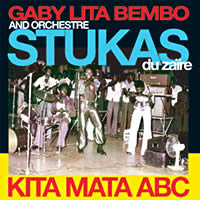
GABY LITA BEMBO & STUKAS DU ZAIRE
KITA MATA ABC
I don't like music videos on principal, but I do appreciate good documentary footage of bands in concert. Clips of Otis Spann with Muddy Waters and Willie Dixon are important talismans to me. Americans kids got to see the Beatles on Ed Sullivan, while in Britain we got Wilson Pickett and Otis Redding on Ready Steady Go! (Clearly we got the better deal.) The Stukas were one of the classic youth bands of the new wave who grew up on rock and soul in the sixties. During the 1970s they appeared frequently on the state-run television station La Voix du Zaire. The authorities saw the advantage of keeping the youth off the streets during the summer holidays so Lita and the Stuka Boys often had hours of broadcast to themselves. They looked weird but were essentially benign, expressing their difference through music rather than politics or crime. Vincent Luttman, who compiled this Lita Bembo CD for RetroAfric, showed me a clip of one of their performances from 1975. There was a minimal set and stripped-down band of bass, drums and lead guitar, plus Lita wrestling with the mike & impersonating James Brown. At one point the guitarist Bongo Wende started doing a Hendrix: playing the guitar behind his head & picking out leads with his teeth. When the camera tracked back Lita was absent, but then suddenly he appeared stage right lugging a giant crucifix! I have never seen anything like it. Here was this singer reenacting the bleeding Passion of Christ on daytime TV while the cooking Stukas ripped out some blistering soukous! In one move Bembo had outdone the Godfather of Soul, James Brown, and even the posturing Jim Morison. The band's jagged attack matched their name, and they had tons of hits and created many dances in the 70s but sadly their recordings are very ephemeral and the sound is pretty thrashed on some of these rediscovered tracks. It reminds me of the early days of Papa Wemba with his bands Isife Lokole/ Yoka Lokole, another of the touchstones of the early soukous sound. The original Stukas guitarist, Zamunga, was poached by Veve in 1975 and a young Bongo Wende replaced him for a few months. Zamunga then returned, but a year or so later tragically died of hepatitis. At the height of the band's fame, the guitarists Kembo (l'homme invisible) & Le Pop, were drafted in as replacements. Although 50 musicians passed through the Stukas, we know Awilo Longombo played drums for a spell and the great bassist Nguma Lokito also swelled the ranks. Awilo also joined Viva La Musica before going solo and is now (June 2005) one of the biggest stars in all Africa. Despite the sound limitations on a couple of tracks compounded by heavy reverb & echo on the vocals, there is incredible energy as things build to unprecedented levels of intensity. I wished this could have been longer, or a double disc, but here it is, and it is essential. This compilation finds three of the Stukas' best singles, "Toto Seta," "Presidents," and "Odeyo," from the mid 70s, and gives us both sides. The other three tracks are also extended to 8 minutes, without the fade in the middle. It's a big slice of the cake, with chocolate icing and blazing candles. Yum.
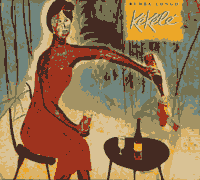
KÉKÉLÉ
RUMBA CONGO (Sterns STCD 1093)
Unplugging finally occurred to the Congolese superstars of the 1970s who have mellowed into the elder statesmen of African music. RUMBA CONGO appears under the soubriquet Kékélé. Kékélé is a fibrous plant and implies long interwoven strands of vine that together provide great strength. Here it's the meeting of three of the Four Stars: Syran M'benza, Nyboma Mwan'Dido, and Wuta Mayi (missing Mansiamina Bopol who is touring with Ricardo Lemvo & Makina Loca), with the natural addition of Papa Noel, Bumba Massa and Loko Massengo.
A few years ago I asked Syran over a beer in Berkeley what he was doing and he said, basically, waiting for something new. His album SYMBIOSE, which was one of the classic soukous albums, was his sole shot at that sound, but he felt he had made that statement and was sitting out the next dance as Loketo and Soukous Stars whirled around the world trying to get it up one more time for the dance-floor diehards.
The new album is light and ethereal in places, but still kicks in, especially when Nyboma is in charge, as he is on two cuts. A delight is the addition of Viviane Arnoux on accordeon. Though she was raised in the French clody musette tradition she has adapted very well to the Congolese idiom and adds a touch of nautical wistfulness which is so welcome instead of a wheezing synth. The horns are not the best, but still another bit of reality.
One gets the feeling the group is avoiding just doing a mouldy oldies set of Grand Kalle material, but when they do a medley of his classics (at 8'39" the longest cut on the album) things really catch fire. The only flaw here is the weakness of the horns which should really be punching counterpoint to the vocals. There are one or two forgettable tracks but there's such a diversity of riches with all the talents aboard that the whole thing goes down very smooth.
After the first Nyboma track the next highlight is Wuta Mayi's "Pinzole ya Africa," again featuring Viviane Arnoux on accordeon, Miguel Gomez on congas, and Jean-Marie Bolongassa on percussion. As Ken Braun says in his passionate liner notes (which include Achille Ngoye's superb potted history of the Congo sound), "those who remember the rumba Congolaise classics feel that Congolese music has lost some of its most appealing characteristics. Rumba Congolaise was always gentle, even at its liveliest. Its sensuousness didn't preclude elegance. So much Congolese music these days is coarse." He points out the return of Mose Se Fan Fan to acoustic music, the sound of some recent Sam Mangwana recordings and the reappearance of Wendo, the 72-year-old father of the Congolese rumba, who recreated his line-up of the late forties in his classic album of 1999 MARIE LOUISE (Label Bleu LBLC 2561). So mine wasn't the only voice saying enough of the "boogie til you puke" seben: let's hear this stuff without the clutter of French production values.